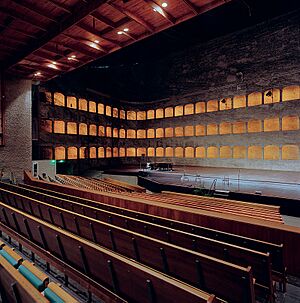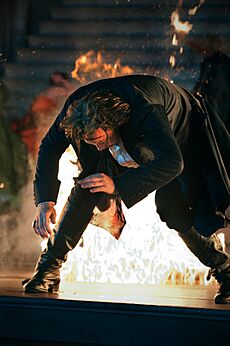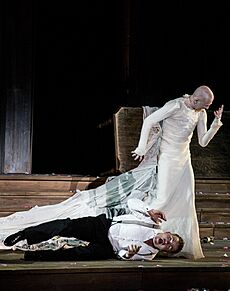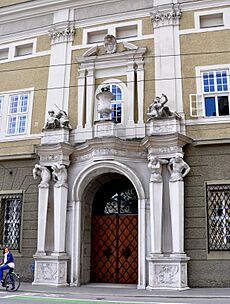Salzburg Festival facts for kids
Quick facts for kids Salzburg FestivalSalzburger Festspiele
|
|
|---|---|
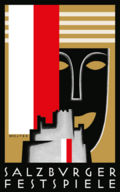 |
|
| Genre |
|
| Begins | late July |
| Ends | end of August |
| Frequency | annual |
| Location(s) | Salzburg, Austria |
| Inaugurated | 1920 |
| People |
|
The Salzburg Festival (in German: Salzburger Festspiele) is a world-famous festival of music and plays. It started in 1920 and takes place every summer for five weeks in Salzburg, Austria. This city is special because it's where the famous composer Wolfgang Amadeus Mozart was born.
The festival is well-known for performing Mozart's operas. A special tradition is the performance of the play Jedermann (which means Everyman). Since 1967, there has also been a smaller Salzburg Easter Festival held each year.
Contents
The Story of the Festival
Music festivals were held in Salzburg as early as 1877, but they stopped in 1910. A new festival was planned for 1914 but was canceled because World War I began.
How the Festival Began
After the war ended in 1918, five creative people decided to bring the festival back. They are known as the founders:
- Hugo von Hofmannsthal, a poet and playwright
- Richard Strauss, a composer
- Alfred Roller, a stage designer
- Franz Schalk, a conductor
- Max Reinhardt, a theater director
Hofmannsthal believed the festival should celebrate peace and bring together people from different cultures. The first official Salzburg Festival opened on August 22, 1920. It began with a performance of Hofmannsthal's play Jedermann on the steps of the Salzburg Cathedral. This became a tradition that continues today.
The first opera, Mozart's Don Giovanni, was performed in 1922.
Building the Theaters
In 1925, the first festival hall was built in what used to be stables for the archbishop's horses. The next year, a nearby horse-riding school called the Felsenreitschule was turned into a theater. This theater is amazing because it's carved right into the rock of the Mönchsberg mountain.
In 2006, the original festival hall was rebuilt into a modern theater for operas and concerts, now called the Haus für Mozart (House for Mozart).
Difficult Times in the 1930s and 40s
From 1934 to 1937, famous conductors like Arturo Toscanini and Bruno Walter led many performances. In 1936, the Trapp Family Singers performed at the festival. Their story later inspired the famous musical The Sound of Music.
The festival faced a hard time in 1938 when Austria was taken over by Nazi Germany. This event was called the Anschluss. Because of the new government, famous artists who were Jewish, like Max Reinhardt, had to leave the country. Conductor Arturo Toscanini quit in protest. The play Jedermann was also stopped.
The festival continued until 1944, when it was canceled because of events related to World War II. But as soon as the war in Europe ended in 1945, the Salzburg Festival reopened that same summer.
The Festival After World War II
After the war, the festival grew famous again, especially for its performances of Mozart's operas. The conductor Herbert von Karajan became the artistic director in 1956 and was a very important leader for many years.
In 1960, a large new opera house called the Great Festival Hall opened. While the festival focused on Mozart and Strauss, it also performed works by other great composers like Verdi and Beethoven.
After Karajan's time, new directors like Gerard Mortier and Peter Ruzicka brought fresh and modern ideas to the festival.
The Festival in the 21st Century
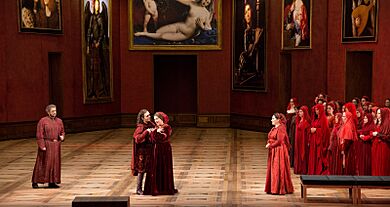
The festival continues to be a major event for music and drama lovers.
What happened in the 2000s?
In 2006, Salzburg celebrated Mozart's 250th birthday in a big way. The festival performed all 22 of his operas, even the ones he never finished. These performances were filmed and released on DVD.
In 2018, Lydia Steier became the first woman to direct a performance of Mozart's famous opera Die Zauberflöte (The Magic Flute) at the festival.
How did the festival handle the COVID-19 pandemic?
In 2020, during the COVID-19 pandemic, most events around the world were canceled. However, the Salzburg Festival created a special safety plan and was able to hold some performances. It was the only major festival in Europe to do so. The leaders took a quote from the founder Hofmannsthal as their motto: "Where the will is awakened, something is already almost achieved."
The Whitsun Festival
Besides the main summer festival, there is also the Salzburg Whitsun Festival. "Whitsun" is another name for the Christian holiday of Pentecost. This smaller festival was started in 1973 by Herbert von Karajan.
It focuses on older music from the Baroque and Classical periods. Since 2012, the famous Italian opera singer Cecilia Bartoli has been its artistic director. She often stars in the main opera performance.
Why is the Festival Important for Salzburg?
The Salzburg Festival is very important for the city's economy. In 2017, it sold about €27 million in tickets. The festival helps create business worth €183 million for Salzburg each year. It also provides around 2,800 jobs in the city. This shows how much a cultural event can help a community.
See also
 In Spanish: Festival de Salzburgo para niños
In Spanish: Festival de Salzburgo para niños
- List of opera festivals


